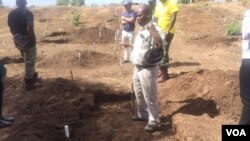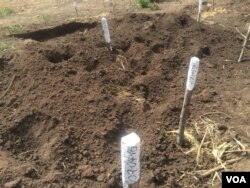For many years, minefields planted by the colonial Rhodesian forces during the war of liberation of the 1970s to stop guerilla incursions into the country, have been an economic barrier for villagers living in the booby-trapped vicinities of villages in Mukumbura communal lands, Mashonaland Central province.
Despite this setback, some locals are now earning a living through removing the landmines for the benefit of their families and thousands of villagers.
Watching some of the villagers removing landmines planted by the Ian Douglas Smith regime is petrifying as the booby-traps can be triggered by any slight movement of a human being, a cow, goat or related animals.
Noel Piroro and Takawira Zenda know the dangers of demining and have mastered it. They move delicately to a demining zone, start identifying landmines using modernized equipment and remove the mines.
They look very relaxed when they work on the landmines. Thanks to the knowledge they derived from Halo Trust, one of the world's largest humanitarian mine clearance organisations. The non-governmental organization claims in its website that it save lives and restores communities threatened by landmines and other weapons of war, such as cluster bombs, stockpiles of small arms and improvised explosive devices or IEDs.
Halo is doing exactly that in Mukumbura where Piroro and Zenda have been highly trained in removing landmines.
Piroro says despite the danger associated with demining, he is now making a living out of clearing landmines.
“Some of the deminers who get a chance to be employed here are constructing their houses and living well.”
Zenda adds that demining is creating some jobs for local people. He says most people, who find work in removing landmines, are earning higher wages than those employed by constrained companies.
“In this area we do not produce much and there is poverty. The demining exercise has created jobs for some of us and with the money we get we assist our families to find food.”
For professional reasons, the two declined to reveal their monthly earnings.
Halo Trust Programme manager, Tom Dibb, says apart from empowering communities, local people also have good knowledge of the minefields.
He says clearing their own land also motivates Mukumbura villagers to do a thorough job in mined fields.
“It is the Halo way of doing things. We recruit locally and train them and we put them to work in the minefields. We get the best information about the minefields too because it is the communities who live here and know what is going on. They are motivated because it is their families who are going to use the land. It makes sense that they will not leave something behind if they know their own families will be using the land.”
While some people still view demining activities as a preserve for men, in Mukumbura communal lands, even women have joined in clearing minefields.







